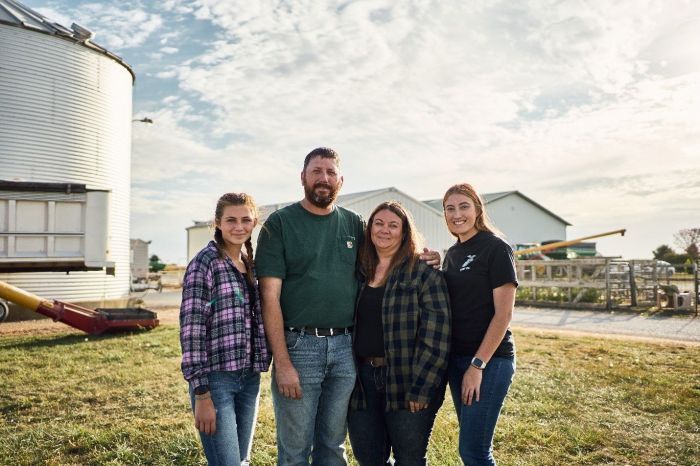ILLINOIS FARM FAMILIES TO BE FEATURED IN SUPER BOWL LVIII COMMERCIAL

Illinois fans tuning into this weekend’s big game may see some familiar faces in a new commercial featuring five Illinois farm families. The commercial, titled “Career Path,” will air during Super Bowl LVIII, Feb. 11, and close out Illinois Farm Families’ (IFF) “We are the 96%” campaign, highlighting the state’s family-owned farms.
Farm families featured in the new commercial are the DeSutter family, of Knox County; the Bunting family, of Livingston County; the Leman family, of Woodford County; the Boucher family, of Livingston County; and the Marr family, of Morgan County.
“What an honor it is to be able to represent this legacy and this lifestyle during the Super Bowl this month,” said Marty Marr, a third-generation farmer who works alongside his wife, brother and sons on their Sangamon-Morgan County farm. “I’m only one example of what family farms in Illinois look like, but I know it is so important for all the non-farming families in Illinois to see our families and to understand that we are the ones growing their food and fuel.
“We look just like them in so many ways and we all value the same things – family, relationships, protecting our soil and water for future generations, building opportunity for our kids to find a future in the job that they love. I hope that everyone in Illinois who has the chance to watch will see that passion for the family farm in this commercial.”
The commercial will air in the Champaign, Peoria-Bloomington, Quad Cities, Quincy, Rockford, Springfield, St. Louis and Southern Illinois markets, including the Evansville, Ind., and Cape Girardeau, Mo., markets.
In 2023, IFF set out to create more awareness of locally owned farms and build consumer trust through showing Illinoisans exactly who’s behind their food: families. Since launching in February 2023 with the initial “We are the 96%” Super Bowl commercial, the campaign has been promoted statewide and has featured more than 25 farm families across the state.
Matt Boucher, a fourth-generation Livingston County farmer, will also appear in the commercial with daughter, Harlie. He became involved in the “We are the 96%” campaign after sharing a photo of him and his daughter in the combine while his father was driving the auger cart. The photo highlighted the generational aspect of farming.
“There’s a scene in the commercial where we’re walking away from the camera and I’m literally tossing her the keys to the combine with the next shot of her driving the combine. It’s a really cool representation of that idea of passing on the farm to the next generation,” said Boucher.
He added, “The vast majority of Illinois farms are not owned by big corporations. It’s a huge honor to participate in this campaign and act as a bridge between farmers and people outside of agriculture to help them understand where their food comes from, how its grown, and the families that make it all possible.”
Boucher farms alongside his wife, Heather, with help from their teenaged children Harlie, Cole and Delaney. Together, they raise corn, soybeans, wheat and cover crops, as well as pork and chicken for local sales. The operation also includes a trucking business and seed sales.
All families appearing in the commercial are profiled on the campaign’s website at wearethe96.org. Visitors can view behind-the-scenes footage and learn more about each family, their history on the farm and what their farm looks like today. More photos and videos of the families participating throughout the campaign will appear on IFF’s social media accounts, including Facebook, Instagram and YouTube accounts.
Following the on-air debut, the full commercial will be available on IFF’s Facebook page and website.
About Illinois Farm Families
Illinois Farm Families (IFF) represents farmers of all commodities across the state of Illinois. IFF is committed to engaging in conversations with those curious about food, farmers, and farming, and sharing what really happens on the 96% of Illinois farms that are family-owned and operated. IFF is supported by farmer-led organizations, including Illinois Beef Association, IL Corn Marketing Board, Illinois Farm Bureau, Illinois Pork Producers Association, Illinois Soybean Association checkoff program, and Midwest Dairy. For more information about Illinois Farm Families, please visit www.WatchUsGrow.org.
Additional Assets
B-roll, photos, audio clips, and more are available upon request.







